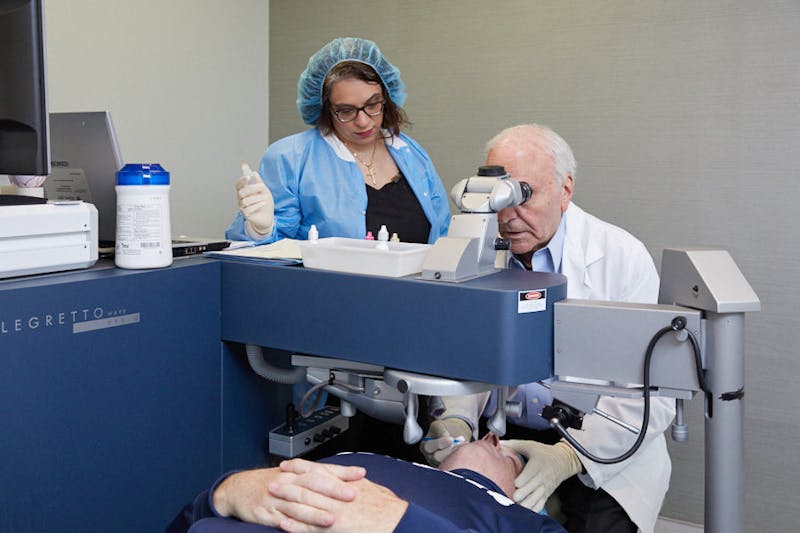
Many people feel nervous before they undergo laser eye surgery. They may have questions like, “Are you awake during LASIK?” and “How long will the procedure take?” Fortunately, there is no need to be worried. This surgery is performed about 700,000 times a year in the United States. In the few decades since it has become routine, laser eye surgery has become a safe and dependable way to correct your vision. But what happens during laser eye surgery?
It’s understandable that many people want to know what they should expect before they go in for their laser surgery. Knowing what happens can be especially helpful for patients who are nervous and wondering how to stay calm during LASIK. So, what can you anticipate before, during, and after your procedure? Read on to get the information you need to feel informed and ready for your LASIK surgery.
Before you decide on laser eye surgery
Your initial evaluation will let your optometrist determine whether you are a candidate for laser eye surgery. If he or she decides that laser eye surgery is a good option for you, you will have the opportunity to ask questions and learn more about the procedure.
Make sure to ask your doctor about the benefits and drawbacks of laser eye surgery and any special circumstances you may have. Of course, you should also consider your options carefully before you decide that surgery is the best choice for you. After all, it is a very good option, but it is not the only one. If you decide this surgical procedure is the best option for your vision, it’s time to learn more about what happens during laser eye surgery.
Before your laser eye surgery
Many people wonder, “Are you awake during LASIK or other laser eye procedures?” Laser eye surgery is an outpatient procedure, so you will be awake the whole time. If that makes you feel anxious, ask your eye surgeon how to stay calm during LASIK. Also keep in mind that you’ll receive numbing drops to ensure you’re comfortable. However, once you settle on a day for your surgery, you will need to plan to have someone pick you up. Between medication and postoperative vision blurriness, it will not be safe for you to drive.
You’ll also need to do some things ahead of time to prepare for your surgery. If you wear contact lenses, you’ll need to stop wearing them for several weeks before your surgery. This allows your corneas to return to their natural shape, ensuring that your eye surgeon can properly assess your eyes before surgery. Talk to your eye surgeon to find out how long you’ll need to go without contacts ahead of your procedure.
It’s also important that you not apply anything to your face for 24 hours or so before your laser eye surgery. This includes lotion, makeup, and perfume. Make sure your face is clean before you go in and follow any directions for cleansing your eyes before surgery. This is because hygiene and self-grooming products can cause infection if they are caught in the surgical site.
During your laser eye surgery
Laser eye surgery is a very quick procedure. In fact, it usually takes less than half an hour. Still, if you’re feeling nervous, you should discuss how to stay calm during LASIK with your surgeon. If you determine it’s necessary, calming medication can be provided. Either way, your eyes will be numbed before the procedure with a special drop solution, then cleaned. The doctor will then use a speculum to open your eye.
Some doctors use a small blade to create the flap in your cornea. Others use a special laser to make the incision instead. Then, your cornea will have suction applied to it. This will not hurt, but you may feel some pressure, and your vision will blur. After the cornea is pressurized, you will be able to see again. However, your vision will fade in and out at different levels until the surgery is complete. At this point, your doctor will open your cornea and ask you to focus on the light of the laser tool.
The tools used in a laser eye surgery are connected to a computer. This ensures that you are kept completely safe during the procedure and that the correct level of power is used. All of these levels are preprogrammed by the doctor before your surgery. So, if you’re wondering, “Are you awake during LASIK through the whole surgery?” the answer is yes. However, the procedure is so fast, that being awake for it won’t be a problem at all.
Once your surgery is complete, your eye will be covered with a patch or shield. This ensures that you do not accidentally hit, rub, or jab your eye until your incision is fully healed. It also helps you remember not to rub your eyes as they may feel a bit itchy, scratchy, or teary as you recover.
After your laser eye surgery
Now that you can answer, “Are you awake during LASIK,” you may also wonder if you need to stay awake after the procedure. It’s actually very important to rest your eyes for several hours following your surgery, so many surgeons encourage you to take a nap after your procedure. Keep your eye shields on, just in case. If you’re unable to nap, you’ll need to rest your eyes in a dark room, avoiding screens, reading, or anything that requires your eyes to work hard.
After the first day, you’ll be able to return to most activities once you’ve gotten the go-ahead from your surgeon. You’ll have a follow up appointment 24-48 hours after your surgery to check your healing. In most cases, you’ll be cleared to drive and return to work at that point, though you should still be careful with your eyes. You may still have some itching, tearing, or dry eye, so follow your doctor’s instructions for eye drops, other medications, and general caution. The majority of the healing from laser eye surgery takes a few weeks, though your corneas are not completely healed for about a year.
Any side effects you experience should dissipate over time as your corneas heal, and your vision will continue to improve. The majority of patients find that while the procedure and healing are relatively quick and easy, the benefits of the surgery typically last years, decades, or even a lifetime. Contact Dello Russo Laser Vision to make an appointment and read our LASIK FAQs to get the answers to other common questions.
